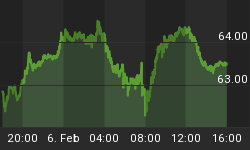This week's wild actions on Wall Street should serve as a stark reminder that few investors have any clue as to what is really going on beneath the surface of America's troubled economy. But this week did bring startling clarity on at least one front. In its August policy statement the Federal Reserve took the highly unusual step of putting a specific time frame for the continuation of its near zero interest rate policy.
Moving past the previously uncertain pronouncements that they would "keep interest rates low for an extended period," the Fed now tells us that rates will not budge from rock bottom for at least two years. Although the markets rallied on the news (at least for a few minutes) in reality the policy will inflict untold harm on the U.S. economy. The move was so dangerous and misguided that three members of the Fed's Open Market Committee actually voted against it. This level of dissent within the Fed hasn't been seen for years.
Many economists have short-sightedly concluded that ultra low interest rates are a sure fire way to spur economic growth. The easier and cheaper it is to borrow, they argue, the more likely business and consumers are to spend. And because spending spurs growth, in their calculation, low rates are always good. But, as is typical, they have it backwards.
I believe that ultra-low interest rates are among the biggest impediments currently preventing genuine economic growth in the US economy. By committing to keep them near zero for the next two years, the Fed has actually lengthened the time Americans will now have to wait before a real recovery begins. Low rates are the root cause of the misallocation of resources that define the modern American economy. As a direct result, Americans borrow, consume, and speculate too much, while we save, produce, and invest too little.
It may come as a shock to some, but just like everything else in a free market, interest rate levels are best determined by the freely interacting forces of supply and demand. In the case of interest rates, the determinative factors should be the supply of savings available to lend and the demand for money by people and business who want to borrow. Many of the beneficial elements of market determined rates are explained in my book How an Economy Grows and Why it Crashes. But allowing the government to determine interest rates as a matter of policy creates a number of distortions.
It was bad enough that the Fed held rates far too low, but at least a fig leaf of uncertainty kept the most brazen speculators in partial paralysis. But by specifically telegraphing policy, the Fed has now given cover to the most parasitic elements of the financial sector to undertake transactions that offer no economic benefit to the nation. Specifically, it will simply encourage banks to borrow money at zero percent from the Fed, and then use significant leverage to buy low yielding treasuries at 2 to 4 percent. The result is a banker's dream: guaranteed low risk profit. In other words it will encourage banks to lend to the government, which already borrows too much, and not lend to private borrowers, whose activity could actually benefit the economy.
This reckless policy, designed to facilitate government spending and appease Wall Street financiers, will continue to starve Main Street of the capital it needs to make real productivity-enhancing investments. American investment capital will continue to flow abroad, denying local business the means to expand and hire. It also destroys interest rates paid to holders of bank savings deposits which traditionally had been a financial pillar of retirees. In addition, such an inflationary policy drives real wages lower, robbing Americans of their purchasing power. The consequence is a dollar in free-fall, dragging down with it the standard of living of average Americans.
Until interest rates are allowed to rise to appropriate levels, more resources will be misallocated, additional jobs will be lost, government spending and deficits will continue to grow, the dollar will keep falling, consumer prices will keep rising, and the government will keep blaming our problems on external factors beyond its control. As the old adage goes, "insanity is doing the same thing over and over again and expecting different results."
Subscribe to Euro Pacific's Weekly Digest: Receive all commentaries by Peter Schiff, Michael Pento, and John Browne delivered to your inbox every Monday.
Click here for free access to Euro Pacific's new special report: What's Ahead for Canadian Energy Trusts?
For a great primer on economics, be sure to pick up a copy of Peter Schiff's hit economic parable, How an Economy Grows and Why It Crashes.















